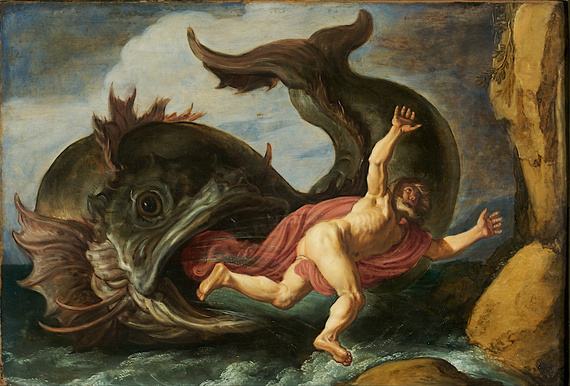The penultimate portion of the Torah, which we read this week in the book of Deuteronomy, as we near the end of the scroll, and the prophetic reading paired with it, from the Second Book of Samuel, are both songs.
King David sings a song that rings similarly to the experience of the prophet Jonah, whose story we heard this past week on our Day of Atonement, on Yom Kippur.
King David says:
The waves of death swirled about me;
the torrents of destruction overwhelmed me.
The cords of the grave coiled around me;
the snares of death confronted me.
In my distress I called to the Eternal One;
I called out to my God.
From his sacred place he heard my voice;
my cry came to his ears. (II Samuel 22:5-7)
King David is speaking poetically about an experience of distress and of calling out from the depths. The story of Jonah is something like a cartoon story-board, or perhaps a graphic novel, bringing the metaphor of King David's poetry to life in vivid and even cinematic terms.
The narrative of Jonah traces a pattern that we see again and again in biblical poetry, and in the odyssey of our biblical people. In brief - and in the first person - the pattern goes like this:
I had a sense of what I ought to have been doing, of the way in which the Divine was calling me to go. But for whatever reason I went willfully in exactly the opposite direction. And I found myself in the deepest trouble and forlornness, feeling I was lost forever. So from the depths of that distress, I called out, yearning to be drawn close again, and promising to do better. Then suddenly, as though in a cosmic convulsion, I found myself lifted up, and my feet set on firm ground again - so that I could pursue my true path anew, and sing of the experience.
As King David describes the rescue:
The earth trembled and quaked,
the foundations of the heavens shook. (II Samuel 22:8)
God reached down from on high and took hold of me;
drew me up out of deep waters. (II Samuel 22:17)
That is the metaphor.
In the Book of Jonah: "The Eternal One commanded the fish, and it spewed Jonah onto dry land" (Jonah 2:10) - the comic book version, so to speak.
Jonah's prayer from the belly of the fish would be very much at home in the Psalms, in the mouth of King David. Even though the story of the book has the prophet praying it from the low-point of his odyssey, from the darkest deep, Jonah's prayer, like many Psalms, describes both the plunge into the abyss and the rescuing uplift after the prayerful calling-out:
You hurled me into the depths,
into the very heart of the seas,
and the currents swirled about me;
all your waves and breakers
swept over me.
I said, 'I have been banished
from your sight;
yet I will look again
toward your holy temple.'
The engulfing waters threatened me,
the deep surrounded me;
seaweed wrapped around my head.
To the roots of the mountains I sank;
the earth beneath barred me in forever.
But you, Eternal One, my God,
brought my life up from the pit. (Jonah 2:2-6)
One need not actually embark on an ill-fated sea voyage, be rocked by a tempest, then tossed overboard, get swallowed by a huge fish, spend a prayerful spell deep in its belly, and finally be spat up on the verge of the destination one was meant to reach in the first place, in order to have the experience Jonah describes. How many times in a lifetime do we streak off in a direction contrary to the call we hear in our heart, only to find ourselves tempest-tossed, downcast, and at the point of despair, looking prayerfully upward from an abject situation, resolving to do better if only given another shot, and in the end wind up giving thanks for the tremendous miracle of a second chance!
In the song that Moses teaches the people, in our Torah reading this week (Deuteronomy 32:1-43) this selfsame pattern is prophesied as playing out on a national scale.
The Eternal One gives the nation every opportunity and so much inspiration, rescuing the people from the straits of bondage with signs and wonders, leading them through the wilderness, pointing them toward a home and a path of seeking righteousness - only for the people to grow arrogant and forgetful, drifting from the way of justice and of covenant. So calamitous are the results, says the song, that only God's stake in an outcome other than ignominious oblivion saves the nation from complete devastation. The song itself, as a poetic encapsulation of this account, is prescribed as the remedy for such moments.
Thank heaven for the non-finality of so many mistakes, for the miracle of not perishing, for the mercy of opportunity renewed!

